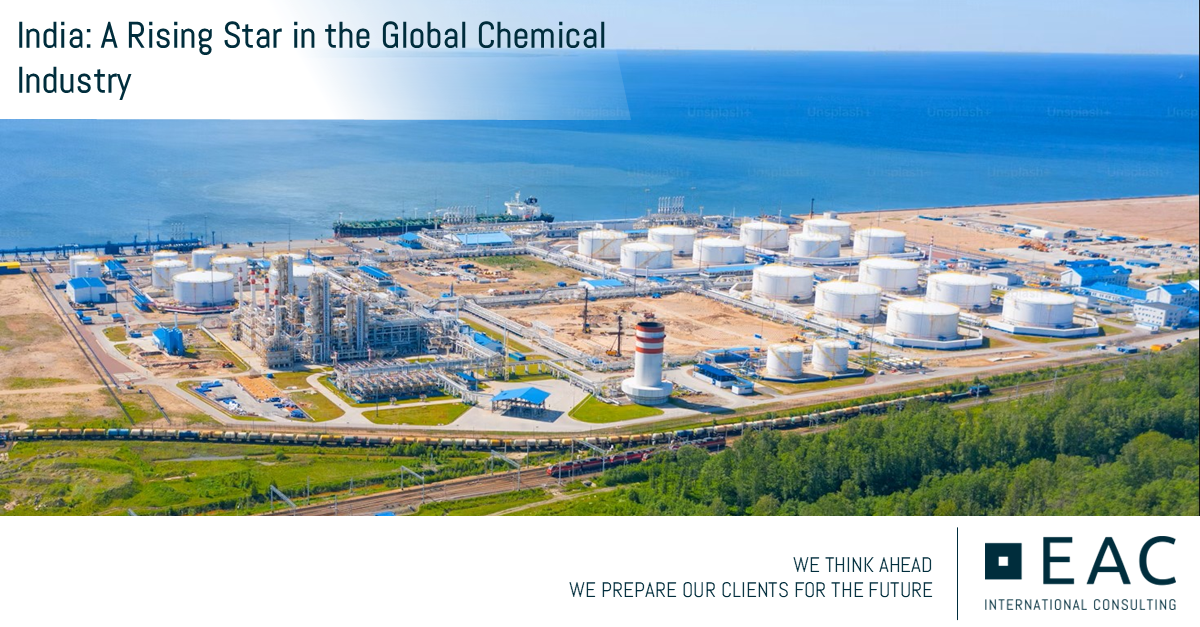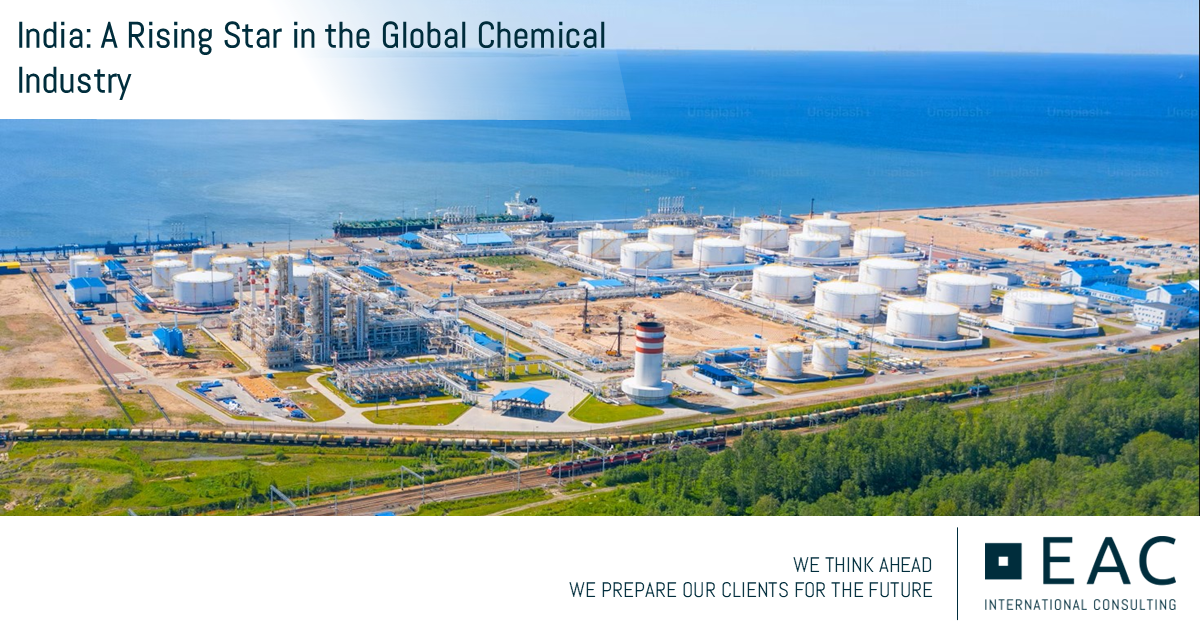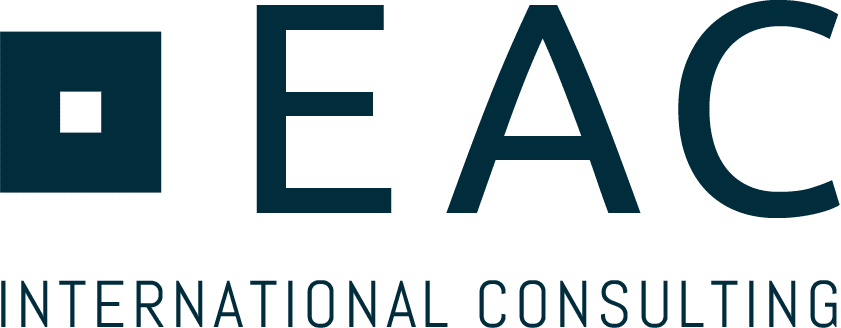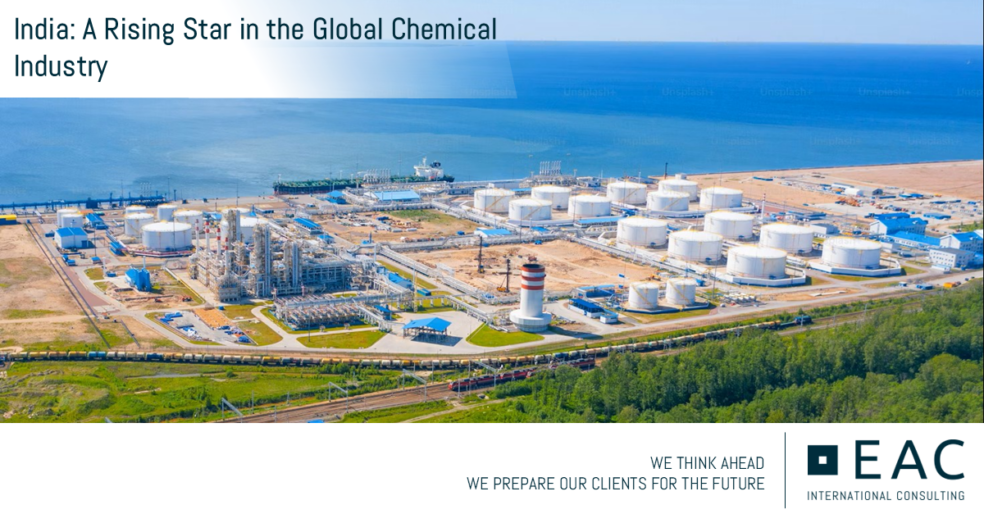India: A Rising Star in the Global Chemical Industry

Currently, the Indian chemical sector is the sixth-largest globally, contributing 3% to the global market and 7% to India’s GDP. It has demonstrated a strong growth rate of 9%, with ambitious targets to reach 300 bln USD (290 bln EUR) by 2028 and 1 trln USD (0.96 trln EUR) by 2040. This growth is supported by both push and pull factors. In FY 2024, India attracted approximately 810 mio EUR in FDI. Government initiatives such as the Production-Linked Incentive (PLI) scheme for critical chemicals and the Remission of Duties and Taxes on Exported Products (RoDTEP) are accelerating the industry’s expansion.
Moreover, major petrochemical companies have committed to substantial capital expenditures to expand their capacities in India, with investments expected to exceed 87 bln USD (84 bln EUR) over the next decade. In addition, India continues to offer demographic advantages, including a growing pool of skilled labor and lower manufacturing costs compared to neighboring countries.
In contrast, the European chemical industry underperformed in 2024 and is expected to remain stagnant throughout 2025, with potential recovery not anticipated until 2026. The industry is facing significant internal and external pressures. Rising labor costs, high taxes, inflation, and soaring energy prices—exacerbated by the Ukraine war—are eroding the industry's competitiveness. For instance, the German chemical sector, along with other energy-intensive industries, has seen a decline in its average production capacity from 82% in 2023 to 75% in 2024.
Additionally, the global industry has been significantly impacted by trade conflicts, pandemic-related lockdowns, and ongoing supply chain disruptions. Looking ahead, there is cautious optimism regarding the potential escalation of trade tensions under the new US government. These tensions could have a twofold impact: directly, reducing the trade between major manufacturers (EU and China) business with the US, and indirectly, forcing China to increase its exports to European and other markets at discounted prices, thereby intensifying competition. In response to these challenges, many European companies are focusing on cost optimization through restructuring, process improvements, divestments, and business line shutdowns.
As a trusted partner with extensive industry expertise, EAC is well-positioned to help chemical companies navigate the growing opportunities in India’s chemical sector. For short-term needs, EAC provides tailored support such as identifying strategic partners, including suppliers and contract manufacturers. For long-term success, EAC offers comprehensive services, including Go-To-Market (GTM) strategy development, manufacturing feasibility studies, and customer acquisition strategies, all aimed at ensuring sustainable growth and competitive advantage in India’s rapidly expanding market.
Our experienced specialists, Ketan Jadhav, Rajesh Raut and Komal Jha, bring extensive knowledge and deep industry expertise to address your specific needs and provide comprehensive solutions. We look forward to supporting your journey and ensuring your success through our dedicated service.
Latest
Seizing India’s Industrial Automation Boom: A Strategic Opportunity for Global Players

Southeast Asia: Rising Pillar in Global Semiconductor Ecosystem

The Low-Altitude Economy (LAE): China’s Emerging Technological Frontier

India: A Rising Star in the Global Chemical Industry


